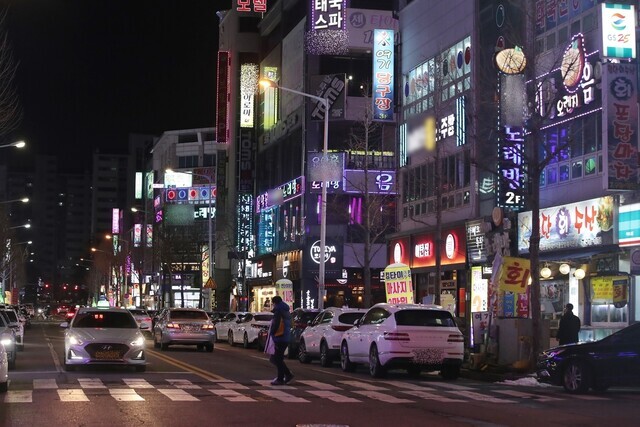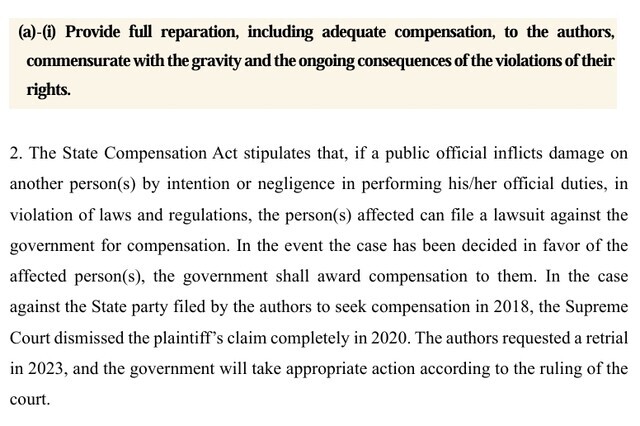
Neon signs glow in an area known for its hostess bars in Korea. (Yonhap)
While the UN Committee on the Elimination of Discrimination against Women, known as CEDAW, concluded that the South Korean government should provide full reparation to three Filipino women for failing to protect them while they became victims of human trafficking, the government is maintaining that it will “take appropriate action according to the ruling of the court” following the women’s request for a retrial in 2023. Such a stance shows that the government is denying the harm suffered by these three women and that it has no intention of implementing UN recommendations.
The Ministry of Gender Equality and Family confirmed on Tuesday that it had drawn up an implementation plan that synthesizes the positions of related ministries, including the Justice Ministry, and submitted it to the UN on May 10 in response to the CEDAW committee’s recommendation for “full reparation” for the Filipino women in 2023.
Based on the CEDAW committee’s recommendation, the victims have filed for a retrial of a court ruling finalized in 2020 that determined that the South Korean government was not liable for damages for ordering their deportation and detention, even though the victims were forced into the sex trade.
However, the government has publicly stated that it will not provide any reparations until the trial currently underway is concluded. The government, to be more exact, the Ministry of Justice, had previously requested a dismissal of the retrial, stating that it was “doubtful that the CEDAW committee’s decision has any legally binding force or influence.”
Kim Jong-chul, the attorney at Advocates for Public Interest Law who is representing the victims, criticized the government by saying, “The victims are giving the government an opportunity to go forward with the UN recommendations, but asking for a dismissal means that the government has no intention of heeding those recommendations.”

An excerpt from the South Korean government’s response to the UN CEDAW Committee on the implementation of its recommendations, submitted to the committee on May 10, 2024.
The victims came to South Korea in 2014 on E-6 visas for performing arts, thinking that they would work as singers. However, they were forced by the owner of the club they were working at to sell sex and were caught in a police crackdown.
After being detained at the Seoul Immigration Office for 45 days, they were given deportation orders. At the time, the prosecutors decided to suspend their indictment of the victims on prostitution charges.
The court also denied the victims’ request to cancel the deportation order and claims for reparation based on how the prosecutors denied the club owners’ charges of forced prostitution.
However, CEDAW concluded in October 2023, after reviewing the complaint filed by the victims in 2018, that the police and courts were in the wrong for dismissing the victims’ history of forced sex trafficking. It also stated that South Korea had failed to identify or protect the three women as the victims of trafficking, and instead treated them as criminals.
On this basis, the women moved last year to request a retrial of the case in which the court concluded the South Korean government bore no liability for compensation for its deportation and detention orders.
Since the victims received deportation orders, the retrial procedures are taking place in an uncertain situation where they have no legal right to stay in South Korea. Foreign nationals who are involved in trials in South Korea are eligible to apply to the Ministry of Justice for “other sojourn” (G-1) status, but the victims have been unable to apply for fear that the deportation order will be enforced in the process.
The victims are asking to be allowed to participate in the trial while having their legal sojourn status guaranteed, while maintaining that the UN’s recommendation of full reparation to those whose rights according to the Convention on the Elimination of All Forms of Discrimination Against Women have been violated means that the South Korean should government is obliged to rectify all matters stemming from their treatment as criminals.
In 2005, the UN General Assembly set forth principles defining the actions required of member states to provide restitution to victims whose rights according to international human rights conventions have been violated. According to those rules, they are obligated to take measures to restore victims to their status before their rights were violated and to provide full and effective compensation, including financial compensation, judicial decisions restoring their dignity and rights, or a formal apology.
Kim, the attorney, said, “In light of UN principles, the government should rescind the suspension of indictment against the victims [on prostitution charges] and reopen the investigation of the business owners who forced them into sex work.”
The administration’s response has been cool.
When asked by the Hankyoreh whether the victims could be permitted to stay in South Korea, the Ministry of Justice replied, “Sojourn permissions are determined based on a verification and review of submitted documents and possible violations of domestic law.”
“We cannot provide any information on whether permissions will be granted,” it said.
It also noted that the victims “have been residing illegally since February 2022 without applying for permission to extend their sojourn.”
On the question of reparation, the ministry observed that the “retrial in the compensation suit that [the victims] filed against the government is still going on.”
“The matter of compensation is something to be considered based on the court’s determination,” it said.
Regarding the call for a renewed investigation of the business owners, it said, “The Ministry of Justice does not have the authority to reopen investigations on specific cases.”
By Oh Se-jin, staff reporter
Please direct questions or comments to [english@hani.co.kr]

